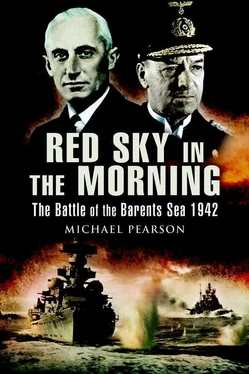The polar ice edge fluctuates greatly with the changing seasons, and in winter it would come down far enough to force the convoys south of Bear Island, and consequently closer to German naval and air bases in northern Norway. Depending upon where the ice edge was situated, the arduous voyage from the UK to Russia would be from 1500 to 2000 miles (2760 to 3680 km). Winter would also see the freezing up of Archangel, leaving only Murmansk through which to discharge cargoes.
The Kola Inlet runs approximately north and south from the Barents Sea to Murmansk, and is the estuary for the River Tuloma (see mapp. 23). On the western shore of the inlet some 5½ statute miles (8.85 km) from its mouth lies Polyarnoe, where destroyers and submarines were based, and where the C-in-C of the Russian Northern Fleet and the Senior British Naval Officer, North Russia, had their administrative offices. Across the inlet (8½ statute miles/13.7 km by water), lies Vaenga where the Royal Navy had established an auxiliary hospital with beds for seventy-four patients. Vaenga was connected by a single track railway with Murmansk, some 16 statute miles (25.7 km) to the south.
Murmansk lies along the eastern shore of the inlet, and since 1928 had been the subject of an ambitious expansion plan to develop what had been principally a fishing village into the Soviet Union’s main ice-free northern port. During the war years the town was subjected to savage and sustained bombing attacks from the nearby Luftwaffe bases in Finland and Norway. [27]
Life aboard ship was miserable in the ‘work horses’ of convoy escort – destroyers, corvettes, minesweepers, trawlers and the like. A ship at sea works, in twenty-first century internet parlance, 24/7 or twenty-four hours a day, seven days a week. For the day-to-day business of convoy escort, a destroyer crew would be organised into four ‘watches’ of four hours each, except for the dog watches which would be two hours – 4–6 p.m. and 6–8 p.m. This ensured that each watch rotated its time and took a turn at the unpopular ‘graveyard shift’, midnight to 4 a.m. Each watch had an officer plus four lookouts on the bridge, one lookout to each corner, while other members of the watch performed routine but essential tasks, which in the Arctic usually entailed using chipping hammers in the constant battle to prevent ice build up on the upper works. Guns would be unmanned but rotated at frequent intervals in an effort to prevent them freezing up. [28]Off watch below, things were not much better. Officers had cabins aft, except the captain, whose sea cabin would be below the bridge, enabling him to be called up at short notice. The men slept (or tried to) in hammocks slung in the mess decks. The atmosphere below would be warm, but fetid with stale sweat and damp clothing; steel doors banged to and fro as crew members working the ship came and went, while in heavy weather icy seas crashed over the ship and down companionways to the decks below. With little or no time to clean up, this would soon turn into a rancid greasy soup 2 or 3 inches (5–7 cm) deep, slopping about the deck. This, and bulkheads streaming with condensation, made keeping anything dry impossible.
Unlike larger ships, the turrets of Royal Navy destroyers were not enclosed; they comprised the gun and a partly enveloping shield. This would cause more problems in the freezing conditions, as ice would form not only on the barrels of the guns but also on breeches and other mechanisms. Anti-freeze grease would help, but would not completely eliminate the problem. If ice did form, the heat of the gun firing would cause it to melt, and water might well seep into the breech, causing the gun to jam. [29]
Northern Norway and the Kola Inlet
Destroyers did not use Murmansk when they were in Russia, but were based with the submarines at Polyarnoe, just inside the Kola Inlet. A ‘run ashore’ for a little rest and relaxation was another pipe dream, as Paddy Donovan recalled.
‘What recreation was there ashore?’ I asked him.
‘None at all. Except the Russian Officers’ Club.
‘What recreation was there at the Russian Officers’ Club?’
‘None at all!’ [30]
There might have been nothing ashore, but the trip could be eventful. London-born Captain Michael Hutton, OBE, RN, then a seventeen-year-old midshipman fresh from Dartmouth Naval College, on his first posting to the new Fiji class cruiser HMS Jamaica , remembered an incident during Christmas 1942. With the ship at anchor off Murmansk he was midshipman of a ship’s boat, and having ferried a sailor with appendicitis to the small hospital ashore on Christmas Day, a further trip was necessary the following day:
Another quick trip ashore in the boat on Boxing Day and a real pleasure to hand round my cigarette case to Russian soldiers. On the return trip another important lesson was confirmed. Never, never, wear sea boots (wellies) as boat’s crew. I had not spotted my bow man was an offender and he slipped overboard. His boots filled up and within seconds in that freezing water he was in real trouble and I knew he could not last for long. Probably within a minute we had him back onboard, just alive, and later I was pleased on behalf of myself and crew to be congratulated on our seamanship. As soon as the lucky sailor had recovered, I insisted he go all the way to Captain’s Report.
Good old Naval justice… the lesson had been driven home. [31]
—♦—
Given the years of brainwashing by the Communist regime and the resultant frostiness of the local population as well as the climate, Murmansk and Archangel were not the most popular ports of call for naval or merchant seamen. Most sailors would certainly have echoed the words of one young Jamaican merchant seaman (a world away from his Caribbean home in both temperature and temperament) who, when asked for his thoughts on North Russia, replied, ‘I’d sho’ like to go any place else – jes’ any place a-tall’. [32]
It would be wrong to suggest, however, that the Russians were completely unappreciative of the Allies’ efforts. Mentioned in Dispatches for his part in the Barents Sea action, Paddy Donovan was also awarded the Russian Order of Patriotic War. This order came with a monthly payment, calculated in roubles, which his bank manager advised equated to around 7 shillings (35 p) per month. Some twenty months later, with Obedient in home waters and his wife Enid expecting a baby, it seemed to Paddy that the £7 or so which had accumulated would come in handy so off he went to the Russian embassy in London to collect. Finally a staff member handed over a large envelope which Paddy took to a nearby park to investigate. On examination it turned out to contain £77 – a pleasant surprise in the circumstances. His comments on his bank manager’s arithmetic are not recorded!
—♦—
It might be assumed that life aboard the larger ships would be easier, but this was not necessarily the case. As a seventeen-year old Boy 1st Class, Lieutenant-Commander Albert Twiddy, DSC, RN, had his first seagoing posting to the Southampton class cruiser HMS Sheffield , joining in July 1942. He recalled life on board.
What I did know at the time was that the ship was to be employed in Northern waters, and I was to get used to my new surroundings, new experiences of living with so many others… of confined living quarters well below decks, and the complete lack of any privacy whatsoever, at whatever the time of day or night. Furthermore, I had not appreciated that in just a few weeks’ time I would find myself suffering extreme distress from seasickness, that the ship would be pressing its way through ice slush and frozen fog, and my messdeck quarters [would be] streaming with condensation, or iced up, with continuous mopping up to prevent water swilling around…
Читать дальше












